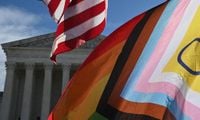The U.S. Supreme Court is set to open its 2025-2026 term with a case that could have sweeping consequences for LGBTQ+ rights across the country. On Tuesday, October 7, the justices will hear arguments in Chiles v. Salazar, a lawsuit challenging Colorado’s 2019 ban on so-called “conversion therapy” for minors—a controversial and widely discredited practice aimed at changing a person’s sexual orientation or gender identity. The outcome could determine the fate of similar bans in more than 20 states, potentially reshaping the legal landscape for transgender and queer youth nationwide.
Colorado’s law, enacted in 2019, prohibits licensed professionals from providing conversion therapy to anyone under the age of 18. The state argues that the law is a straightforward regulation of healthcare, designed to protect children from harm. According to Colorado’s legal brief, there is “overwhelming evidence that efforts to change a child’s sexual orientation or gender identity are unsafe and ineffective.” State officials warn that overturning the ban would “undercut states’ longstanding ability to protect patients and clients from harmful professional conduct.”
The case was brought by Kathy Chiles, a mental health counselor, who claims that the state’s ban violates her free speech rights under the First Amendment. Represented by the Alliance Defending Freedom (ADF)—a Christian legal group known for its opposition to abortion and LGBTQ+ rights—Chiles argues that the law is a “viewpoint-based speech restriction.” In her legal filings, she contends that the law allows counselors to support clients in embracing a transgender identity, but not if those clients wish to align their identity with their sex assigned at birth. “The government has no business censoring private conversations between clients and counselors,” said Jim Campbell, chief legal counsel for ADF, in a statement to TIME. “Colorado’s law harms these young people by depriving them of caring and compassionate conversations with a counselor who helps them pursue the goals they desire.”
The challenge is a pre-enforcement case, meaning Chiles filed suit not in response to any action taken against her, but in anticipation of possible future enforcement. The Supreme Court agreed to hear the case after lower courts issued conflicting decisions on similar laws, setting the stage for a potentially landmark ruling. The central question is whether Colorado’s ban on conversion therapy is an unconstitutional infringement on free speech, or a permissible regulation of professional conduct aimed at protecting public health.
Legal experts say the outcome is far from certain. Eugene Volokh, a First Amendment scholar at UCLA, notes that while states have long imposed restrictions on professional-client speech—such as prohibiting lawyers from giving advice to non-clients, or medical professionals from providing harmful treatments—the Supreme Court has yet to rule directly on conversion therapy bans. Volokh points to the Court’s 2018 decision in National Institute of Family and Life Advocates v. Becerra (NIFLA), in which justices struck down a California law requiring pregnancy crisis centers to disclose information about state family planning services. “The Supreme Court suggested that there is no special exception for professional-client speech,” Volokh told TIME. However, he also noted the Court left open the question of how far states can go in regulating counseling practices deemed dangerous or incompetent by the majority of the profession.
Supporters of Colorado’s law argue that conversion therapy is not a legitimate therapeutic practice, but rather a harmful and discredited intervention. In an amicus brief, the American Psychological Association, joined by more than a dozen other major medical organizations, described conversion therapy as “ineffective and potentially harmful,” noting that it doesn’t address any underlying mental health condition. The brief cited research linking sexual orientation and gender identity change efforts (SOGICE) to “loneliness, regular illicit drug use, suicidal ideation, and suicide attempt[s],” as well as “severe psychological distress.”
Indeed, a 2020 peer-reviewed study by The Trevor Project, published in the American Journal of Public Health, found that LGBTQ+ youth who had undergone conversion therapy were more than twice as likely to report having attempted suicide in the past year compared to their peers. Casey Pick, director of law and policy at The Trevor Project, told TIME that “we would find ourselves in a situation where you would no longer have a law that prohibits this conduct ahead of time and protects young people from being subjected to it” if the Supreme Court strikes down Colorado’s ban.
The ADF, for its part, has cited several scholars to bolster its argument that conversion therapy should not be banned. Critics, however, accuse the group of misrepresenting research and deceiving the court about the scientific consensus on the practice’s dangers. The organization’s involvement has drawn scrutiny, given its history of opposing LGBTQ+ rights and its role in other high-profile legal battles.
The stakes extend well beyond Colorado. There is no federal law restricting conversion therapy in the United States, but 23 states and numerous municipalities have enacted their own bans—many modeled after Colorado’s. Executive orders in other states also restrict the practice, meaning that the Supreme Court’s decision could have immediate and far-reaching effects. Depending on the ruling’s scope, existing state-level bans could be overturned, leaving LGBTQ+ youth in many parts of the country without legal protection from conversion therapy.
The case arrives at a time of heightened scrutiny of the Supreme Court itself. According to a September Gallup poll, only 42% of Americans trust the Court—a near-record low, reflecting widespread perceptions that the institution has shifted too far to the right. This term, the justices are also expected to decide cases on transgender athletes’ participation in sports, presidential powers, campaign finance, gun control, and other contentious issues. The Court has already rejected Ghislaine Maxwell’s appeal of her sex trafficking conviction, leaving her 20-year sentence in place.
Internationally, the United States is something of an outlier. Countries including Brazil, Canada, Spain, Germany, and France have all enacted nationwide bans on conversion therapy, reflecting a broad consensus in the global medical community about the practice’s dangers. As the Supreme Court weighs its decision, advocates and opponents alike are watching closely, aware that the outcome could set a precedent for years to come.
Whatever the justices decide, the ruling in Chiles v. Salazar will reverberate far beyond Colorado’s borders, shaping the rights and protections of LGBTQ+ youth—and the obligations of those who counsel them—across the United States.


